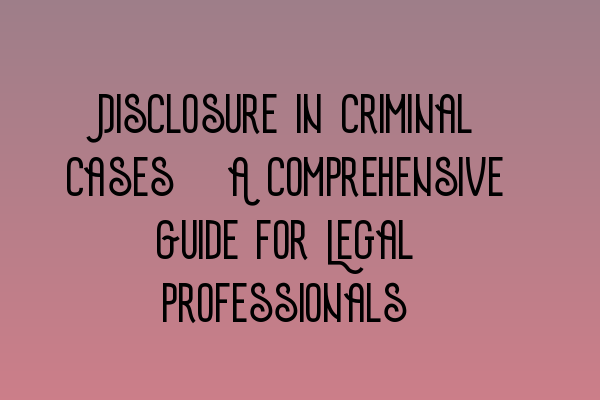Disclosure in Criminal Cases: A Comprehensive Guide for Legal Professionals
As legal professionals, we understand the critical role that disclosure plays in criminal cases. Disclosure refers to the process of sharing relevant information between the prosecution and the defense in a criminal trial. It ensures that both sides have access to all the evidence, enabling a fair and just trial.
In this comprehensive guide, we will delve into the intricacies and importance of disclosure in criminal cases. Whether you’re a solicitor, barrister, or aspiring legal professional, this guide will provide you with valuable insights and information. So, let’s begin!
What is Disclosure?
Disclosure is a fundamental aspect of the criminal justice system. It involves the prosecution sharing all evidence, whether it supports the case for the prosecution or the defense, with the defense team. Without proper disclosure, the defense may be unaware of vital evidence that could bolster their case or undermine the prosecution’s case.
Why is Disclosure Important?
Disclosure is crucial for upholding the principles of fairness and justice in criminal trials. It allows the defense team to effectively prepare their case, ensure a fair trial, and protect the rights of the accused. It also helps build trust in the legal system by promoting transparency and ensuring that all parties have access to the same information.
Key Principles of Disclosure
To fully grasp the concept of disclosure, it’s essential to understand the following key principles:
1. Openness and Transparency: The prosecution has a duty to disclose all relevant evidence to the defense. This includes both incriminating and exculpatory evidence.
2. Continuous Duty: Disclosure is an ongoing obligation throughout the entire trial process. If new evidence arises, the prosecution must promptly disclose it to the defense.
3. Favorable Material: The prosecution must disclose any material that may reasonably be considered favorable to the defense. This includes evidence that may cast doubt on the accused’s guilt, credibility of witnesses, or the reliability of evidence.
4. Witness Information: The prosecution must disclose the existence of any witnesses and provide their statements, even if their testimony contradicts their case.
Disclosure Process
The disclosure process typically involves the following steps:
1. Identification of Material: The prosecution must identify all material that is relevant to the case, regardless of whether it aids the prosecution or the defense.
2. Review and Redaction: The prosecution reviews the identified material and redacts any irrelevant or sensitive information, such as personal details of witnesses.
3. Aggregation and Indexing: Once redacted, the material is aggregated and indexed, allowing for easy reference during the trial.
4. Disclosure to the Defense: The prosecution provides the defense with the disclosed material, allowing them sufficient time to review, analyze, and prepare their case.
Challenges and Issues
While disclosure is a necessary aspect of the criminal justice system, several challenges and issues can arise:
1. Volume of Material: In complex cases, the volume of disclosed material can be overwhelming. Effective case management and organization are crucial to ensure the defense can review all the evidence thoroughly.
2. Sensitive Information: When disclosing sensitive information, such as informant identities or national security-related material, careful consideration must be given to balancing disclosure obligations with national security concerns.
3. Digital Evidence: With the rise of digital technology, the inclusion of digital evidence, such as emails, text messages, and social media posts, has added complexity to the disclosure process. Ensuring the authenticity and integrity of digital evidence requires specialized knowledge and expertise.
Conclusion
Disclosure plays a central role in ensuring fairness and justice in criminal cases. It is vital for legal professionals to understand the principles and process of disclosure to effectively represent their clients. By adhering to the principles of openness and transparency, continuously fulfilling the duty of disclosure, and addressing the challenges that arise, we can ensure that the criminal justice system upholds the principles of a fair trial.
For more information on related topics, check out the following articles:
– SQE Exam Prep: Essential Study Materials for Aspiring Solicitors
– Demystifying the Solicitors Qualifying Examination Format
– SQE Exam for International Lawyers: Challenges and Success Strategies
– LLC Formation Made Simple: Step-by-Step Guide for UK Entrepreneurs
– LLC Formation: A Step-by-Step Guide for UK Entrepreneurs
If you found this guide informative, feel free to share it with your colleagues or anyone interested in understanding the intricacies of disclosure in criminal cases.
Disclaimer: The information provided in this blog post is for educational purposes only and does not constitute legal advice. Always consult with a qualified legal professional regarding specific legal matters.
